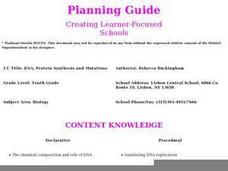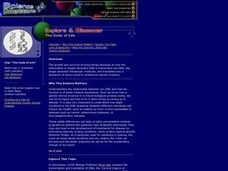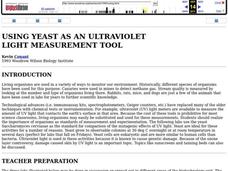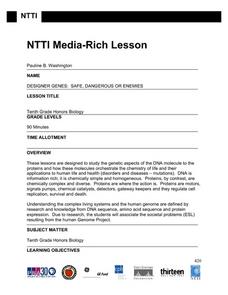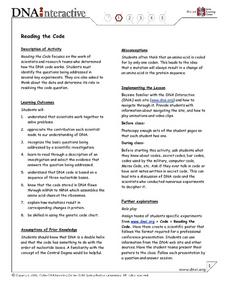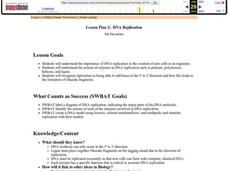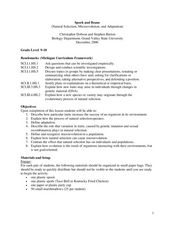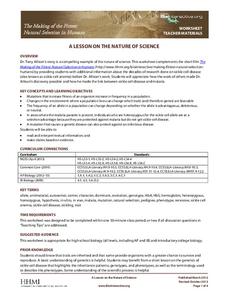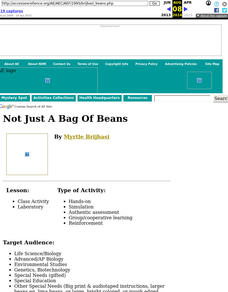Curated OER
Evolution and Genes
In this psychology worksheet, students complete 5 short answer questions about traits, mutations and the theory of natural selection.
Curated OER
DNA, Protein Synthesis and Mutations
Tenth graders investigate the chemical composition of DNA and RNA and how they work together to synthesize protein. They discover genetic codes, gene chromosome theory, and how the environment influences our appearance.
Curated OER
The Code of Life
Students study genes, DNA and medical research. They watch "The Code of Life" video and answer discussion questions regarding the transcription and translation of DNA and how errors in these processes and mutations in DNA can produce...
Curated OER
Using Yeast as an Ultraviolet Light Measurement Tool
Students accurately measure the relationship between radiation dose and either survival or some genetic event such as mutation or recombination. They investigate the damage that was done to the DNA molecule as a result of exposure to...
Curated OER
Meiosiss Revisited
Seventh graders are engaged in a lesson plan that covers the concept of meiosis with the intention of covered sexual reproduction. They cover the concept of genetic traits and how they are transmitted over generations with or without...
Howard Hughes Medical Institute
The Molecular Evolution of Gene Birth and Death
An upper-level biology activity, the comprehensive worksheet found here accompanies a PowerPoint and the video The Making of the Fittest: The Birth and Death of Genes, both of which are linked to through the website. Depending on the...
Curated OER
Genome Interactions
In this genome interactions worksheet, students read the passage about genome interactions then apply the knowledge to answer several short answer questions.
Curated OER
Temperature and the Tomato
You will need a photovoltaic system and monitor at your school in order to obtain all of the data required to thoroughly implement this instructional activity. Your class monitors daily temperature and insolation amounts over a two week...
Curated OER
Evolution
Students investigate the concept of evolution and its implications upon the origin and development of life. They conduct research using a variety of resources while focusing upon cross-over and mutations. The information is used to set...
Curated OER
DNA Code
Students synthesize information gathered from the web on reading the DNA code. In this upper-level biology lesson, students use an online resource to gain information about DNA codes and then create posters on what they have learned....
Curated OER
Change Through Time
In this evolution activity, students will complete a table by writing in the era and biological event based on 4 different time periods of Earth's history. Students will answer 8 fill in the blank questions based on the different origin...
Curated OER
"Chips" Off the Old Block?
Students study using analogies between common items or occurrences and science concepts. They use the analogy of cookie recipes to that of the DNA "recipes" for living things to help us explain more about mutations.
Curated OER
The Living Environment
Ninth graders study the work of Alice Huang and complete activities on mutations. For this investigative lesson students complete several activities and discuss their findings at the end.
Nuffield Foundation
Following Gene Transfer by Conjugation in Bacteria
After the lab, you'll be able to solve this analogy: Natural selection is to vertical transfer of genes as ___ is to the horizontal transfer of genes. Young biologists conduct an experiment on E. coli bacteria to explore the process of...
Curated OER
Creative Ways To Teach Evolutionary Concepts
Students explore evolutionary concepts in cartoons and lab activities. They describe and explain evolutionary concepts featured in a cartoon and participate in laboratory activities.
Curated OER
Patterns of Evolution and Selection
Can your young biologists interpret population graphs, match macroevolution patterns and descriptions, and answer multiple choice questions about evolution? Find out with a comprehensive three-page quiz covering some specific examples of...
Curated OER
DNA Replication
Students create a model of DNA and simulate replication with their models in an activity that uses licorice, colored marshmallows, and toothpicks. Students also label a diagram of replication and indicate major parts of the DNA molecule.
Curated OER
Spork and Beans
Students examine natural selection, how it works and how it can cause microevolution. In this evolution lesson students complete a lab activity that shows the effects that natural selection has on organisms.
Howard Hughes Medical Institute
A Lesson on the Nature of Science
If you are looking for a great way to present natural selection in humans, look no further. This handout is intended to accompany the 14-minute video The Making of the Fittest: Natural Selection in Humans, which can be found on the...
Curated OER
Zebra, Zebra Where Are Your Stripes?
Young scholars observe the embryological development in the zebrafish. Developmental hierarchy from three germ layers is studied in depth. Research is validated on the body plan of the embryo.
Curated OER
Not Just a Bag of Beans
Learners determine the types of natural selection and variation that exists in a population, using beans.
Curated OER
Evolution Lab
Students examine the pattern of natural variation in a society. They examine Darwin's theory of evolution and analyze data. They use computer programs to graphically display the variation in organisms.
Curated OER
Mammals: Mammals and Their Ways
Students study the difference between innate and learned behaviors. They observe the adaptations and behaviors of mammals in this series of lessons.
Curated OER
Transcription and Translation Lab Activity
Students investigate DNA strands. They study the sequence to determine if it is DNA or RNA and write the mRNA nucleotide sequence. After stringing the beads together to create the mRNA sequence they translate it into an amino acid...



